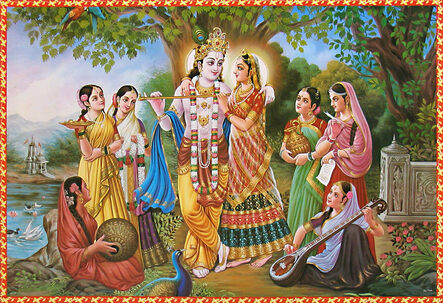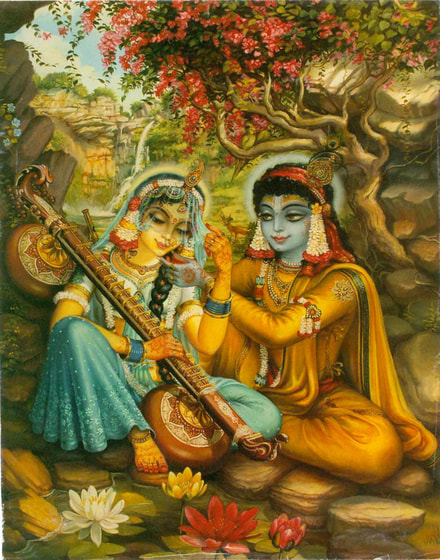Anand — Bliss

Sanskrit word for bliss is anand (Devanagari: आनंद ISO15919: ānaṁda ).
Anand is the original name of God because it signifies the true nature of God. In other words bliss is not a characteristic of God. Neither is it one of the attributes of God. Instead anand is God .
Just as the thing that has light and heat is fire. Fire does not inherit these from elsewhere. Rather the thing that has these two attributes is called fire.
Similarly, the Vedas define God as
आन्नदो ब्रह्मेति व्यजानात्
ānnado brahmeti vyajānāt
"God is Anand " .
There is nothing in His being except Anand .
There are many levels of bliss. We can divide them into two –
Worldly bliss
Although, there are many other levels of bliss in this material world and those are also referred to as anand but they should not be confused with divine bliss. As the Vedas declare -
सैषानंदस्य मीमांसा भवति। युवा स्यात्साधु युवाध्ययाकः।
आशिष्ठो दृढ़ष्ठो बलिष्ठो तस्येयं सर्वा पृथिवी वित्तस्य पूर्णा स्यात्।
स एको मानुष आनंदः ॥
saiṣānaṃdasya mīmāṃsā bhavati| yuvā syātsādhu yuvādhyayākaḥ|
āśiṣṭho dṛṛhṣṭho baliṣṭho tasyeyaṃ sarvā pṛthivī vittasya pūrṇā syāt|
sa eko mānuṣa ānaṃdaḥ ||
The sole ruler of the entire earth ( mrityu lok ), who is young, kind, educated, respected, and whose land abounds in crops and wealth would be considered the happiest of all men."
But thousand times higher than this highest happiness of the earth is the happiness of the planet of Manushya-Gandhava . Likewise, the happiness of the planets of Dev Gandharva, Pitri-dev, Ajanaj-dev, Karma dev, Nitya dev, Indra dev, Brihaspati, Prajapati and Brahma (creator) are correspondingly thousand times more than the previous one.

So, you can see that amongst the material abodes, the abode of Creator Lord Brahma is the most luxurious.
आब्रह्मभुवनाल्लोकाःपुनरावर्तिनोर्जुन। गीता 8.16
ābrahmabhuvanāllokāḥpunarāvartinorjuna। gītā 8.16
"But, even after enjoying the luxuries of the abode of Creator Lord Brahma one has to return to the cycle of birth and death".
And the pursuit of bliss will continue.
यत्पृथिव्यां व्रीहि यवं हिरण्यं पशवस्त्रियः।
नालमेकस्य पर्याप्तं तस्मात्तृष्णां परित्यजेत् ॥ महाभारतम् 5-63-11
yatpr̥thivyāṁ vrīhi yavaṁ hiraṇyaṁ paśavastriyaḥ।
nālamekasya paryāptaṁ tasmāttr̥ṣṇāṁ parityajet ॥ mahābhāratam 5-63-11
Even if one were to get the luxuries of the entire sansar , still the desires will remain as unfulfilled as they are today".
Characteristics of worldly bliss
The happiness from mrityu lok to the abode of Brahmlok is material. All of it is
- Limited - reduction of misery is meant as happiness in the cosmic world. And there are things that give more joy than every other object.
- Temporary - After a while the miseries overcome the worldly happiness.
- Ever diminishing - After one enjoys the object for an extended period of time then the joy one gets from it starts to abate
Divine bliss
The Vedas say
यो वै भूमा तत्सुखम्
yo vai bhūmā tatsukham
"bliss is unlimited in quantity"
According to Vedas the true happiness (or joy, bliss, anand ) has following characteristics:
- Unlimited : no other bliss surpasses it in magnitude
- Eternal : it does not cease one day
- Ever new : it always feels new and never goes stale
- Ever increasing : constantly increases in magnitude
- Conscious : it is not inert, instead it is alive and sentient
- Omniscient : it is all knowing
There are many levels of divine bliss as well

Spiritual happiness starts from liberation called jiva Mukti . Yet, according to Jagadguruttam Shri Kripalu Ji Maharaj there is no anand-bliss in mukti since liberation means eternal freedom from Maya . When Maya goes then all its vices also leave. So, the jeev is free from miseries of the sansar -the material world AND yet hasn't attain the bliss that the jeev aspires for.
After Mukti the jeev merges into Impersonal form of Brahm-The Supreme God . Since the enjoyer became one with the object of enjoyment, the enjoyer can no longer enjoy bliss.
- Thus, the realm of happiness starts from Vaikunth . However, here the divine majesty is dominant.
- Nectar of Dwarika and Mathura are increasingly higher than that of Vaikunth as well. They have increasing levels of sweetness.
- But the levels of bliss of love which has no trace of majesty starts from the divine Vrindaban. This is the most admired and adorable level.
This bliss of Vrindavan further ascends to the levels of Kunj (grove), Nikunj (dense groves) and Nibhrit Nikunj (unapproachable groves).
- Kunj (grove) : sakhis and sakhas (cowherd friends of Shri Krishna) can serve and enjoy the leelas of Shri Radha and Shri Krishna .

- Nikunj (dense groves) : In Nikunj Asht Maha Sakhi along with those jeev who are surrendered to these Asht Maha Sakhi can serve Shri Radha Krishna - The Divine Couple .

- Nibhrit Nikunj is the place of most intimate pastimes of Radha Krishna - The Divine Couple where even the Asht Maha Sakhis cannot reach.
By the grace of a genuine saint a jeev can attain any of these levels of bliss except the bliss of Nibhrit Nikunj . After attaining the level of divine bliss the saint is empowered to bestow the bliss of any of the levels below his own and up to his own level.
So the wise ones
1. aspire to attain the highest possible level of bliss and
2. surrender to a rasik saint of the same spiritual caliber.




